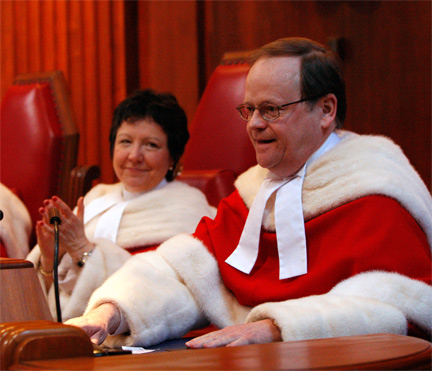In the very first case he heard as judge of the Supreme Court Canada, Justice Thomas Cromwell dissented in his decision. Being “his own person” was the mark of Cromwell’s seven-year tenure on the bench of the country’s top court, lawyers say.
 Yesterday, Supreme Court Chief Justice Beverley McLachlin announced Cromwell’s plans to retire in September. She said his contributions to the court are “unsurpassed.”
Yesterday, Supreme Court Chief Justice Beverley McLachlin announced Cromwell’s plans to retire in September. She said his contributions to the court are “unsurpassed.”
“In his time at the court, his colleagues have always benefited from his wisdom, his rigour and his friendship,” said McLachlin. “Outside the court, Justice Cromwell’s tireless efforts to increase access to justice will continue to benefit Canadians long after his retirement from the bench. We will miss him greatly.”
Cromwell was appointed to the Supreme Court in December 2008. He had previously served as a judge of the Nova Scotia Court of Appeal and worked as executive legal officer to Supreme Court of Canada chief justice Antonio Lamer from 1992 to 1995.
“Being a judge is both a great privilege and an onerous responsibility. I will always be grateful for the opportunity that I have been given to serve Canada in this capacity,” Cromwell said. “As my time as a judge draws to a close, I believe more firmly than ever that an independent and effective judiciary is a cornerstone of democracy.”
A heavy-lifter on the Supreme Court’s bench, Cromwell decided landmark cases including Canada (Attorney General) v. Downtown Eastside Sex Workers United Against Violence Society, a public interest standing matter; Peracomo v. Telus, an international maritime law case; and Tercon v. B.C., a decision highly anticipated by the bar on exclusion clauses in contracts.
Cromwell is “so completely no-nonsense as a judge on the bench that he had a nose for baloney as finely tuned as any delicatessen owner,” says Supreme Court litigator Eugene Meehan, who adds the judge is also extremely hardworking.
“I know from credible sources that his enormous capacity for work – including weekends – both tired and awed his law clerks,” Meehan says.
As a judge, Cromwell was committed to the issue of access to justice. He chaired the Action Committee on Access to Justice in Civil and Family Matters, and penned a report titled Access to Civil & Family Justice: A Roadmap for Change in 2013.
“He was outreaching, if I could use that phrase. He was opening up an understanding of the court,” says prominent criminal lawyer Bill Trudell. “It’s a big loss, and he’s leaving earlier than we all would have hoped. But having said that, his legacy will be one of calm wisdom.
“And he’s a nice guy, too,” adds Trudell.
Cromwell’s pending departure Sept. 1 will leave a void in the court, and create the first opportunity for Prime Minister Justin Trudeau to appoint a judge to the top court. Some say this should also be an opportunity to change the appointment process, which has varied wildly during previous prime minister Stephen Harper’s tenure, reaching its controversial apex with the failed appointment of Marc Nadon to the top court.
Trudell says the new government should model its Supreme Court appointment process after its senator selection process. A committee comprised of representatives from across the country should be tasked with consulting with the bar to find the best candidates for the job, and pass on the list of qualified individuals to the prime minister, says Trudell.
He suggests doing away with the current parliamentary committee.
“I think the public would be really impressed and happy with that and I think it’s something that should be considered,” says Trudell.
Cromwell, who hails from Nova Scotia, would have to be replaced by another judge from the Atlantic provinces. To date, Newfoundland and Labrador has not been represented by a judge in the highest court. But whether the new appointee should come from that province should not be main determining factor, says Trudell.
“It’s time for someone from the Maritimes or from the East to replace Justice Cromwell, if that’s possible. I don’t think you should sort of say, ‘It’s Newfoundland’s time,’” as long as an “imminently qualified” judge is appointed from the eastern region, says Trudell.
A requirement that the appointee be bilingual should also not stop a qualified judge from sitting on the bench, says Trudell.
“You can always learn a language,” he says. “Let’s just say we decided it was time for a First Nations representative, and if that person is imminently qualified but didn’t speak French, I don’t think you [should] pass them over because they can learn it. The same thing with a woman.”










